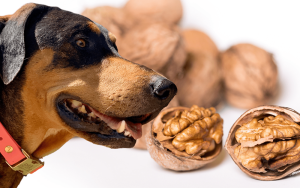Can Dogs Eat Cashews? The Complete Guide to Safe Snacking for Your Pup

When it comes to feeding your dog, it’s crucial to be aware of what’s safe and what’s harmful. Many pet owners wonder whether it’s safe to give their dogs human snacks, and cashews are often a point of confusion. While cashews are a popular and nutritious
snack for humans, the question remains: Can dogs eat cashews? In this comprehensive guide, we’ll explore the potential health benefits and risks of feeding cashews to your dog, helping you make an informed decision about your pet’s
diet.
Table of Contents
- Introduction: Can Dogs Eat Cashews?
- The Nutritional Value of Cashews
- Are Cashews Safe for Dogs to Eat?
- Potential Benefits of Cashews for Dogs
- Potential Risks of Cashews for Dogs
- How to Safely Feed Cashews to Your Dog
- How Many Cashews Can You Give Your Dog?
- Alternatives to Cashews for Your Dog
- Conclusion: Should You Feed Your Dog Cashews?
1. Introduction: Can Dogs Eat Cashews?
As a dog owner, you may be tempted to share some of your snacks with your pet. Cashews, known for their creamy texture and rich flavor, may seem like an innocent treat to share with your dog. But before offering your furry friend any cashews, it’s essential
to understand how they affect a dog’s health. While cashews are not toxic to dogs, there are important considerations to ensure they are fed safely and in moderation.
In this article, we’ll take a detailed look at cashews and whether they should be a regular part of your dog’s diet. We’ll break down the nutritional aspects, potential health benefits, risks, and how to feed cashews to your dog properly. Let’s dive into
whether dogs can eat cashews and how to safely incorporate them into their treats.
2. The Nutritional Value of Cashews
Cashews are rich in various nutrients that benefit humans, such as healthy fats, vitamins, and minerals. Understanding the nutritional makeup of cashews can help clarify why they may or may not be suitable for dogs.
- Healthy Fats: Cashews are high in unsaturated fats, which can be beneficial for humans. However, dogs’ digestive systems are not designed to handle high-fat foods in large quantities.
- Protein: Cashews contain protein, which supports muscle and tissue repair. While protein is vital for dogs, too much protein can stress their kidneys over time, especially for dogs with preexisting kidney issues.
- Vitamins and Minerals: Cashews are rich in magnesium, phosphorus, and zinc, all of which are important for maintaining healthy bones, muscles, and immune systems in both humans and dogs.
- Fiber: Cashews contain a small amount of dietary fiber, which can help with digestion, but too much fiber can cause gastrointestinal upset in dogs.
While cashews have some health benefits, these nutrients need to be considered in the context of your dog’s specific needs and dietary requirements. Now, let’s explore whether the nutrients in cashews are beneficial or harmful to your dog.
3. Are Cashews Safe for Dogs to Eat?
Potential Benefits of Cashews for Dogs
While not a necessary part of a dog’s diet, cashews may offer a few benefits when consumed in moderation:
-
Healthy Fats for Coat and Skin Health: The unsaturated fats in cashews can help improve the health of your dog’s skin and coat. Healthy fats are known to reduce dryness and flakiness in the skin and promote a shiny, soft coat.
-
Protein for Muscle Maintenance: Dogs require protein for muscle growth and maintenance. Although cashews are not as high in protein as some animal-based foods, they still contribute to meeting your dog’s protein needs if fed occasionally.
-
Magnesium and Bone Health: Magnesium plays an essential role in bone health and muscle function. Providing your dog with magnesium-rich foods like cashews in small amounts may help support strong bones and muscles.
-
Antioxidant Properties: Cashews contain antioxidants like vitamin E and selenium, which can help protect your dog’s cells from oxidative stress. These antioxidants can support your dog’s immune system and overall health.
While these benefits sound promising, it’s important to remember that cashews should only be an occasional treat, and they are not necessary for your dog’s daily diet.
Potential Risks of Cashews for Dogs
Despite the potential benefits, there are some risks associated with feeding cashews to dogs, especially in large quantities:
-
High Fat Content: Cashews are high in fats, which, when consumed in large amounts, can lead to pancreatitis in dogs. This condition occurs when the pancreas becomes inflamed due to the excessive intake of fatty foods. Pancreatitis
can be painful and may require veterinary treatment. -
Weight Gain: Due to the high calorie and fat content of cashews, they can contribute to weight gain if given too frequently. Obesity is a common health problem in dogs, and a poor diet can exacerbate this condition.
-
Digestive Issues: Dogs may have difficulty digesting cashews, especially if they are given too many. This can lead to stomach upset, diarrhea, or vomiting. Some dogs may also be allergic to cashews, which could cause symptoms
like itching, swelling, or gastrointestinal distress. -
Choking Hazard: Whole cashews can pose a choking hazard, especially for smaller dogs or puppies. Always ensure that cashews are cut into small, manageable pieces if you choose to feed them to your dog.
-
Toxic Additives: Some commercially available cashews are salted or flavored with additives that can be harmful to dogs. Salt, for instance, can lead to electrolyte imbalances and dehydration, while certain flavorings may be toxic
to dogs.
4. How to Safely Feed Cashews to Your Dog
If you decide to share cashews with your dog, it’s essential to do so safely. Here are some guidelines for feeding cashews to your dog:
- Limit the Quantity: Cashews should only be given in moderation. One or two cashews at a time is usually sufficient for most dogs.
- Avoid Flavored or Salted Cashews: Always choose plain, unsalted cashews with no added flavors or preservatives. Salted cashews can lead to dehydration and other health issues.
- Cut Them Into Small Pieces: To reduce the risk of choking, cut the cashews into small, manageable pieces that are easy for your dog to chew.
- Monitor for Allergic Reactions: When feeding cashews to your dog for the first time, watch for signs of allergies, including swelling, itching, or gastrointestinal upset. If any of these symptoms occur, discontinue feeding cashews
and contact your vet. - Consult Your Veterinarian: Before introducing new foods into your dog’s diet, it’s always a good idea to consult your veterinarian, especially if your dog has any preexisting health conditions.
5. How Many Cashews Can You Give Your Dog?
Cashews are high in fat and calories, so it’s important to limit how many you give to your dog. As a general rule, small dogs should have no more than one or two cashews at a time, while larger dogs can have a few more. Remember, cashews should be considered
an occasional treat and not a regular part of your dog’s diet.
If your dog has specific health issues like obesity, pancreatitis, or kidney disease, it’s best to avoid feeding cashews altogether. Always consult with your veterinarian to determine the appropriate amount of cashews based on your dog’s individual needs.
6. Alternatives to Cashews for Your Dog
If you’re looking for healthier snack options for your dog, consider these alternatives:
-
Carrots: Low in calories and high in fiber, carrots are a great alternative to cashews. They also help promote dental health by acting as a natural toothbrush.
-
Apple Slices: Apples are a healthy treat packed with vitamins and fiber. Be sure to remove the seeds and core before giving them to your dog, as they contain cyanide, which is toxic to dogs in large quantities.
-
Blueberries: These tiny fruits are packed with antioxidants and are safe for dogs in small amounts. They’re a great way to support your dog’s immune system.
-
Pumpkin: Rich in fiber and vitamins, pumpkin is a great digestive aid for dogs. You can give your dog plain, cooked pumpkin as a snack.
-
Peanut Butter: If your dog enjoys cashews, try feeding them a small amount of unsweetened, xylitol-free peanut butter. It’s rich in healthy fats and protein.
7. Conclusion: Should You Feed Your Dog Cashews?
In conclusion, cashews are not toxic to dogs, but they should be given in moderation and with caution. While cashews provide some nutritional benefits like healthy fats, protein, and antioxidants, they can also pose risks such as pancreatitis, digestive
upset, and weight gain if overfed. It’s essential to ensure that the cashews you give your dog are plain and unsalted, and that you cut them into small pieces to avoid choking hazards.
As with any new food, always monitor your dog for signs of allergies or discomfort after eating cashews, and consult your veterinarian if you have any concerns about your dog’s diet. While cashews can be a tasty occasional treat, there are many other
safe and healthy alternatives to offer your dog, such as carrots, apples, or blueberries.
By being mindful of the risks and following the guidelines for safe snacking, you can make the best choices for your dog’s health and happiness.






